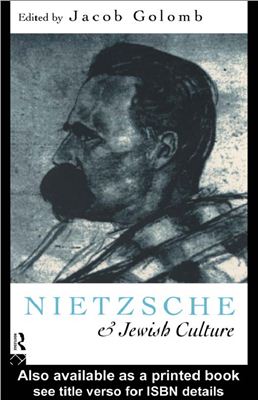London - New York: Routledge, 1997. - xii + 282 p.
ISBN 978-0415095136.
Friedrich Nietzsche occupies a contradictory position in the history of ideas: he came up with the concept of a master race, yet an eminent Jewish scholar like Martin Buber translated his Also sprach Zarathustra into Polish and remained in a lifelong intellectual dialogue with Nietzsche. Sigmund Freud admired his intellectual courage and was not at all reluctant to admit that Nietzsche had anticipated many of his basic ideas.
This unique collection of essays explores the reciprocal relationship between Nietzsche and Jewish culture. It is organized in two parts: the first examines Nietzsche's attitudes towards Jews and Judaism; the second Nietzsche's influence on Jewish intellectuals as diverse and as famous as Franz Kafka, Martin Buber, Franz Rosenzweig and Sigmund Freud. Each carefully selected essay explores one aspect of Nietzsche's relation to Judaism and German intellectual history, from Heinrich Heine to Nazism.
ISBN 978-0415095136.
Friedrich Nietzsche occupies a contradictory position in the history of ideas: he came up with the concept of a master race, yet an eminent Jewish scholar like Martin Buber translated his Also sprach Zarathustra into Polish and remained in a lifelong intellectual dialogue with Nietzsche. Sigmund Freud admired his intellectual courage and was not at all reluctant to admit that Nietzsche had anticipated many of his basic ideas.
This unique collection of essays explores the reciprocal relationship between Nietzsche and Jewish culture. It is organized in two parts: the first examines Nietzsche's attitudes towards Jews and Judaism; the second Nietzsche's influence on Jewish intellectuals as diverse and as famous as Franz Kafka, Martin Buber, Franz Rosenzweig and Sigmund Freud. Each carefully selected essay explores one aspect of Nietzsche's relation to Judaism and German intellectual history, from Heinrich Heine to Nazism.

